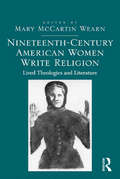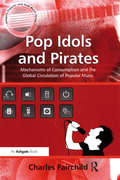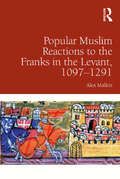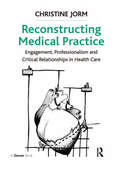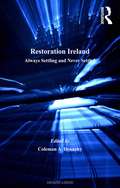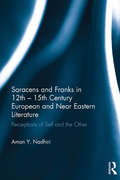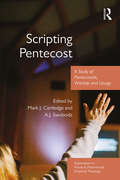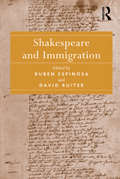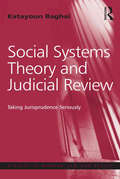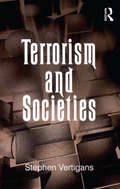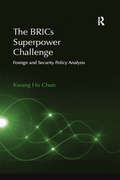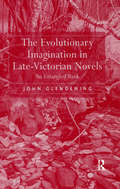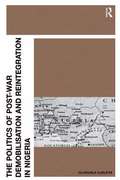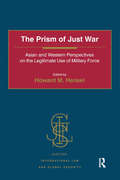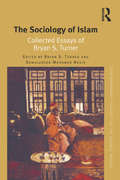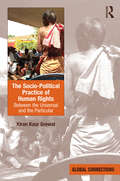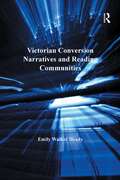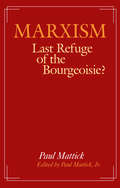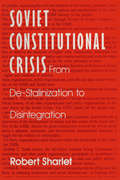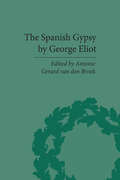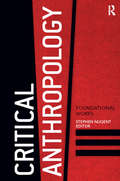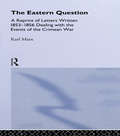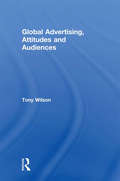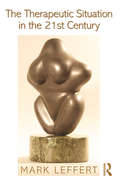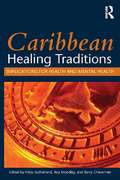Special Collections
Benetech’s Global Certified Accessible Titles
Description: Benetech’s GCA program is the first independent third-party EPUB certification to verify ebook accessibility. By creating content that is born accessible, publishers can meet the needs of all readers. Learn more: https://bornaccessible.benetech.org/
- Table View
- List View
Nineteenth-Century American Women Write Religion
by Mary McCartin WearnNineteenth-century American women’s culture was immersed in religious experience and female authors of the era employed representations of faith to various cultural ends. Focusing primarily on non-canonical texts, this collection explores the diversity of religious discourse in nineteenth-century women’s literature. The contributors examine fiction, political writings, poetry, and memoirs by professional authors, social activists, and women of faith, including Elizabeth Stuart Phelps, Angelina and Sarah Grimké, Louisa May Alcott, Rebecca Harding Davis, Harriet E. Wilson, Sarah Piatt, Julia Ward Howe, Julia A. J. Foote, Lucy Mack Smith, Rebecca Cox Jackson, and Fanny Newell. Embracing the complexities of lived religion in women’s culture-both its repressive and its revolutionary potential-Nineteenth-Century American Women Write Religion articulates how American women writers adopted the language of religious sentiment for their own cultural, political, or spiritual ends.
Pop Idols and Pirates
by Charles FairchildThe music industry has been waging some very significant battles in recent years, reacting to numerous inter-related crises provoked by globalization, digitalization and the ever more extensive commercialization of public culture. These struggles are viewed by many as central to the survival of the central mediators in the consumption of popular music. These battles are not just against piracy and the sharing of digital song files on the internet. The music industry is also struggling to find ways to compete or integrate with many other forms of entertainment, including films, television programmes, mobile phones, DVDs and video games in an extremely crowded communications environment. The battles currently being fought by the music industry are about nothing less than its continued ability to create and maintain specific kinds of profitable relationships with consumers. This book presents two inter-related cases of crisis and opportunity: the music industry's epic struggle over piracy and the 'Idol' phenomenon. Both are explicit attempts to control and justify the particular ways in which the music industry makes money from popular music through specific kinds of relationships with consumers. The battles over piracy have been fought with a remarkable collection of campaigns consisting of advice, coercion and argument about what is or is not the best way to consume music. From these complicated and often contradictory campaigns we form an unusually clear picture of what many within the music industry imagine their industry to be. In a complementary way, 'Idol' works to demonstrate the joy and pleasure of consuming popular music the 'right' way. By creating a series of intertwined relationships with consumers around multiple sites of consumption, incorporating television, radio, live performance, traditional print media campaigns, text messaging and all manner of internet-based systems of communication and 'fan management,' the producers of 'Idol' present an ideal relationship between musicians and audiences. Instead of focusing on selling CDs, the music industry's digital Achilles' heel, 'Idol' has given the music industry an integrated platform for displaying its expanded palette of products and venues for consumption. When understood in specific relation to the battle against piracy, Fairchild's analysis of 'Idol' and the emerging promotional cultures of the music industry it exhibits shows how multiple sites of consumption, and attempts to mediate and control the circulation of popular music, are being used to combat the foundational challenges facing the music industry.
Popular Muslim Reactions to the Franks in the Levant, 1097–1291
by Alex MallettThe issue of Muslim reactions to the Franks has been an important part of studies of both the Crusades and Islamic History, but rarely the main focus. This book examines the reactions of the Muslims of the Levant to the arrival and presence of the Franks in the crusading period, 1097-1291, focussing on those outside the politico-military and religious elites. It provides a thematic overview of the various ways in which these 'non-elites' of Muslim society, both inside and outside of the Latin states, reacted to the Franks, arguing that it was they, as much as the more famous Muslim rulers, who were initiators of resistance to the Franks. This study challenges existing views of the Muslim reaction to the crusaders as rather slow and demonstrates that jihad against the Franks started as soon as they arrived. It further demonstrates the difference between the concepts of jihad and of Counter-Crusade, and highlights two distinct phases in the jihad against the Franks: the 'unofficial jihad' - that which occurred before uniting of religious and political classes - and the 'official jihad' - which happened after and due to this unification, and which has formed the basis of modern discussions. Finally, the study also argues that the Muslim non-elites who encountered the Franks did not always resist them, but at various times either helped or were unresisting to them, thus focussing attention away from conflict and onto cooperation. In considering Muslim reactions to the Franks in the context of wider discourses, this study also highlights aspects of the nature of Islamic society in Egypt and Syria in the medieval period, particularly the non-elite section of society, which is often ignored. The main conclusions also shed light on discourses of collaboration and resistance which are currently focussed almost exclusively on the modern period or the medieval west.
Reconstructing Medical Practice
by Christine JormReconstructing Medical Practice examines how doctors see health care and their place in it, why they remain in medicine and why they are limited in their ability to lead change in the current system. Doctors are beset by doubts and feel rejected by systems where they should be leaders - some see their role as 'flog[ging] a derelict system to get the last breath of workability out ... for their patients'. Others simply turn away. Rigorous studies carried out at large public teaching hospitals in Australia found that doctors were reluctant to increase safety in the wider health system, despite making every effort for their 'own' patients. Doctors' self-esteem was found to be delicate due to the uncertain nature of their work; colleagues provide the support doctors need to deliver good care. However, these essential relationships and their cherished connections with patients have disadvantages: reducing doctors' ability to admit to error. On top of this, senior doctors predict a future bereft of professional values - one where medicine is 'just a job'. While the loss of professional identity introduces new risks for patients and doctors, the repercussions of the more self-serving attitudes of younger doctors are unknown. Reconstructing Medical Practice concludes that regulation, despite its recent proliferation, is a clumsy and limited approach to ensuring good care. It presents original and much-needed ideas for ways to rebuild the critical relationship between doctors and the system. By better valuing communicative interactions and workplace relationships, safe and satisfying medical practice can be reconstructed.
Restoration Ireland
by Coleman A. DennehyIn recent decades, the historiography of early modern Ireland in general, and of the seventeenth century in particular, has been revitalised. However, whilst much of this new work has focused either on the critical decades of the 1640s or the Williamite wars, the Restoration period still remains largely neglected. As such this volume provides an opportunity to explore the period between 1660 and 1688, and reassess some of the crucial events it witnessed. For whilst it may lack some of the high drama of the Civil War or the Glorious Revolution, this was a time that established a political and social settlement, based upon the maintenance of the massive land confiscations of the 1650s, that would underpin the social and class structure of Ireland until the end of the nineteenth century. Including contributions from both established and younger scholars, this collection provides a set of interlocking and interrelated essays that focus on the central concerns of the volume, whilst occasionally reaching beyond the chronological and thematic barriers of the period as required. The result is a homogenous volume, that not only addresses a glaring historiographical gap in critical areas of the Restoration period; but also serves to take stock of the work that has been done on the period; and as a consequence of this it will help stimulate and provoke further argument, debate, and research into the history of Ireland during the Restoration period. Directed primarily at an academic audience, this collection will be useful to a range of scholars with an interest in seventeenth century political, social and religious history.
Saracens and Franks in 12th - 15th Century European and Near Eastern Literature
by Aman Y. NadhiriSaracens and Franks in 12th - 15th Century European and Near Eastern Literature examines the tension between two competing discourses in the medieval Muslim Mediterranean and medieval Christian Europe: one rooted in the desire to understand the world and one's place in it, and another promoting an ethnocentric narrative. To this end, it examines the construction of an image of the Other for Muslims in the Eastern Mediterranean and for Christians in Western Europe in works of literature, particularly in the works produced in the centuries preceding the Crusades; and it explores the ways in which both Muslim and Christian writers depicted the Enemy in historical accounts of the Crusades. The author focuses on medieval works of ethnography and geography, travel literature, Muslim and Christian accounts of the Crusades, and the romances of Western Europe to trace the evolution of the image of the Eastern Mediterranean Muslim in medieval Western Europe and the Western European Christian in the medieval Muslim world, first to understand the construct in the respective scholarly communities, and then to analyze the ways in which this conception informs subsequent works of non-fiction and fiction (in the Western European context) in which this Muslim or Christian Other plays a prominent role. In its analysis of the medieval Mediterranean Muslim and European Christian approaches to difference, this book interrogates the premises underlying the concept of the Other, challenging formulations of binary opposition such as the West versus Islam/Muslims.
Scripting Pentecost
by A. J. Swoboda and Mark J. CartledgeScripting Pentecost explores and develops an analysis of worship and liturgy in Pentecostal and Charismatic traditions. Organized into three main sections, history, theology, and contemporary practice, the first section quarries the historical trajectories of classic Pentecostalism, the Charismatic movement, Third-Wave, and Oneness Pentecostalism. Particular attention is given to the liturgical approaches of some of the earliest leaders, including William J. Seymour, Alexander Boddy, and Aimee Semple McPherson.
The second section, constructive theology, offers theological approaches to liturgical studies from Pentecostal and Charismatic perspectives. In this section the Pentecostal and Charismatic tradition is advanced and extended by an interaction with ecumenical sources. The third section, case studies in contemporary worship theology and practice, examines the actual performance of liturgy through selected global case studies chosen to reflect a diversity of ecclesial practice in Africa, Asia, Europe, North America, Latin America and Oceania.
Shakespeare and Immigration
by Ruben EspinosaShakespeare and Immigration critically examines the vital role of immigrants and aliens in Shakespeare's drama and culture. On the one hand, the essays in this collection interrogate how the massive influx of immigrants during the reign of Queen Elizabeth I influenced perceptions of English identity and gave rise to anxieties about homeland security in early modern England. On the other, they shed light on how our current concerns surrounding immigration shape our perception of the role of the alien in Shakespeare's work and expand the texts in new and relevant directions for a contemporary audience. The essays consider the immigrant experience; strangers and strangeness; values of hospitality in relationship to the foreigner; the idea of a host society; religious refuge and refugees; legal views of inclusion and exclusion; structures of xenophobia; and early modern homeland security. In doing so, this volume offers a variety of perspectives on the immigrant experience in Shakespearean drama and how the influential nature of the foreigner affects perceptions of community and identity; and, collection questions what is at stake in staging the anxieties and opportunities associated with foreigners. Ultimately, Shakespeare and Immigration offers the first sustained study of the significance of the immigrant and alien experience to our understanding of Shakespeare's work. By presenting a compilation of views that address Shakespeare's attention to the role of the foreigner, the volume constitutes a timely and relevant addition to studies of race, ethics, and identity in Shakespeare.
Social Systems Theory and Judicial Review
by Katayoun BaghaiThis book demonstrates the empirical gains and integrative potentials of social systems theory for the sociology of law. Against a backdrop of classical and contemporary sociological debates about law and society, it observes judicial review as an instrument for the self-steering of a functionally differentiated legal system. This allows close investigation of the US Supreme Court’s jurisprudence of rights, both in legal terms and in relation to structural transformations of modern society. The result is a thought-provoking account of conceptual and doctrinal developments concerning racial discrimination, race-based affirmative action, freedom of religion, and prohibition of its establishment, detailing the Court’s response to boundary tensions between functionally differentiated social systems. Preliminary examination of the European Court of Human Rights’ privacy jurisprudence suggests the pertinence of the analytic framework to other rights and jurisdictions. This contribution is particularly timely in the context of increasing appeals to fundamental rights around the world and the growing role of national and international high courts in determining their concrete meanings.
Terrorism and Societies
by Stephen VertigansWhich socializing agents are influential in people joining terror groups? What ideologies do terror groups hold? Which aspects of societies and social contexts contribute towards groups forming and people joining them? This book considers a range of influential terror groups from the last 40 years, exploring relationships between people, local and global social processes, and activities that result in acts of terrorism. Examining Islamic groups alongside nationalist, 'red' and far right organizations, Stephen Vertigans identifies important similarities in the social contexts, experiences of members and some of their demands. Key questions are applied to a range of case studies of contemporary relevance. The groups studied originated from Europe, the United States, Asia and Africa and are associated with religion, nationalism, pro-state terrorism, militias and racism. Each chapter offers the reader a clear understanding about why particular terror groups form, while comparative analysis draws out commonalities and distinctions.
The BRICs Superpower Challenge
by Kwang Ho ChunIn an imaginative and interesting way, Kwang Ho Chun seeks to capture the dynamics of the changing international system and the prospects for a change in the international distribution of power. The idea that new superpowers could rise and that some of the BRICs (Brazil, Russia, India and China) could be such superpowers, is particularly intriguing and the main idea explored in this study. In line with neo-realist approaches, this book argues that in a unipolar world competitors will rise to challenge the global hegemon. As the power profiles of the BRICs rise and they gain greater control of geo-global politics, they are likely to attain significant regional dominance among other regional powers although their underdeveloped tradition of hard power and internal challenges could prevent them from gaining superpower status. This book captures the dynamics of the changing international system and the prospects for a change in the international distribution of power.
The Evolutionary Imagination in Late-Victorian Novels
by John GlendeningDominated by Darwinism and the numerous guises it assumed, evolutionary theory was a source of opportunities and difficulties for late Victorian novelists. Texts produced by Wells, Hardy, Stoker, and Conrad are exemplary in reflecting and participating in these challenges. Not only do they contend with evolutionary complications, John Glendening argues, but the complexities and entanglements of evolutionary theory, interacting with multiple cultural influences, thoroughly permeate the narrative, descriptive, and thematic fabric of each. All the books Glendening examines, from The Island of Doctor Moreau and Dracula to Heart of Darkness, address the interrelationship between order and chaos revealed and promoted by evolutionary thinking of the period. Glendening's particular focus is on how Darwinism informs novels in relation to a late Victorian culture that encouraged authors to stress, not objective truths illuminated by Darwinism, but rather the contingencies, uncertainties, and confusions generated by it and other forms of evolutionary theory.
The Politics of Post-War Demobilisation and Reintegration in Nigeria
by Olukunle OjeleyeWith an increasing international interest in post civil war demobilisation and reintegration, especially in Africa, Ojeleye presents a well timed body of knowledge on the Nigerian civil war. Moreover, this book provides an in-depth study of the modalities and processes of the demobilisation and reintegration exercises carried out at the end of the Nigerian civil war and assesses their implications for national politics in the West African nation. The author identifies the political, socio-economic and cultural background to the Nigerian civil war and discusses the central theme of demobilisation, disarmament and reintegration (DDR) in Nigeria against the backdrop of the policy of the country's post war reconstruction, reconciliation and rehabilitation exercise (the 3Rs). Though the central theme is Nigeria, it compares the demobilisation and reintegration exercise in Nigeria with other attempts in Sub Sahara Africa by highlighting the important deviations and drawing some conclusions on the Nigerian experience. It also touches on issues relating to international involvement and intervention in civil wars and the roles of the African Union, the Commonwealth of Nations and the United Nations.
The Prism of Just War
by Howard M. HenselThrough a careful examination of religious and philosophical literature, the contributors to the volume analyze, compare and assess diverse Western, Islamic, Hindu and East Asian perspectives concerning the appropriate criteria that should govern the decision to resort to the use of armed force and, once that decision is made, what constraints should govern the actual conduct of military operations. In doing so, the volume promotes a better understanding of the various ways in which diverse peoples and societies within the global community approach the question of what constitutes the legitimate use of military force as an instrument of policy in the resolution of conflicts.
The Sociology of Islam
by Bryan S. Turner and Kamaludeen Mohamed NasirTaking a thematic approach, Bryan S. Turner draws together his writings which explore the relationship between Islam and the ideas of Western social thinkers. Turner engages with the broad categories of capitalism, orientalism, modernity, gender, and citizenship among others, as he examines how Muslims adapt to changing times and how Islam has come to be managed by those in power.
The Socio-Political Practice of Human Rights
by Kiran Kaur GrewalThis book examines discourses of rights and practices of resistance in post-conflict societies, exploring the interaction between the international human rights framework and different actors seeking political and social change. Presenting detailed new case studies from Sierra Leone, Sri Lanka and Kosovo, it reveals the necessity of social scientific interventions in the field of human rights. The author shows how a shift away from the realm of normative political or legal theory towards a more sociological analysis promises a better understanding of both the limits of current human rights approaches and possible sites of potential. Considering the diverse ways in which human rights are enacted and mobilised, The Socio-Political Practice of Human Rights engages with major sites of tension and debate, examining the question of whether human rights are universal or culturally relative; their relationship to forms of economic and political domination; the role of law as a mechanism for social change and the ways in which the language of human rights facilitates or closes sites of radical resistance. By situating these debates in specific contexts, this book concludes by proposing new ways of theorizing human rights. Empirically grounded and offering an alternate framework for understanding the fluid and ambiguous operation of power within the theory and practice of human rights, this volume will appeal to scholars of sociology, law and politics with interests in gender, resistance, international law, human rights and socio-legal discourse.
Victorian Conversion Narratives and Reading Communities
by Emily Walker HeadyBecause Victorian authors rarely discuss conversion experiences separately from the modes in which they are narrated, Emily Walker Heady argues that the conversion narrative became, in effect, a form of literary criticism. Literary conventions, in turn, served the reciprocal function as a means of discussing the nature of what Heady calls the 'heart-change.' Heady reads canonical authors such as John Henry Newman, Charles Dickens, Charlotte Brontë, George Eliot, and Oscar Wilde through a dual lens of literary history and post-liberal theology. As Heady shows, these authors question the ability of realism to contain the emotionally freighted and often jarring plot lines that characterize conversion. In so doing, they explore the limits of narrative form while also shedding light on the ways in which conversion narratives address and often disrupt the reading communities in which they occur.
Marxism--Last Refuge of the Bourgeoisie?
by Paul Mattick, Jr.Drawing upon released documents, memoirs and party-history works, the process and impact of the political campaigns in China between 1950 and 1965 is documented. Complete with extensive interviews with Chinese scholars and former officials, the book reviews the findings of the first edition.
Soviet Constitutional Crisis
by Robert SharletMoving from the adoption of the "post-Stalin" Constitution of 1977 through its subsequent implementation under Brezhnev, Andropov, and Chernenko to the radical legal "restructuring" of the Gorbachev years, Robert Sharlet traces the gradual evolution of a nascent constitutionalism in the erstwhile USSR. Sharlet, a noted authority on Soviet law and constitutional development, demonstrates the gradual transformation of law from an instrument of Communist Party rule into the new "rules of the game" for nonauthoritarian political development. In effect, he argues, one of Gorbachev's most durable achievements may be his redefinition of Soviet politics into a legal idiom along with his relocation of policymaking from behind the closed doors of Party conclaves into the more open, emergent arena of constitutional government. In analyzing the politics of law from the Brezhnev era to the rise of Yeltsin, the author takes account of the "war of laws", the symbolic uses of the Soviet constitution, and even the fact that the leaders of the failed coup attempted to justify their seizure of power on constitutional grounds. Constitutionalism has sufficiently suffused Soviet public life, the book concludes, that most of the sovereign republics as successors to the former USSR, have begun designing their futures - to varying degrees - in constitutional forms.
The Spanish Gypsy by George Eliot
by Antonie Gerard van den BroekIn 1864, George Eliot began writing her longest poem, "The Spanish Gypsy". This project exhausted her, and her partner took the manuscript away from her for fear it was making her ill. This work explains what Eliot read to research the poem, which parts caused her particular problems and summarises the poem's critical reception.
Critical Anthropology
by Stephen NugentCritical anthropology has had a major influence on the discipline, shifting it away from concepts of bounded societies with evolutionary trajectories to complex analyses of interconnected economic, political, and social processes. This book brings together some of critical anthropology’s most influential writings, collecting classic articles and spirited rebuttals by major scholars such as Eric Wolf, Marshall Sahlins, Sidney Mintz, Andre Gunder Frank, and Michael Taussig. Editor Stephen Nugent positions these key debates, originally published in the journal Critique of Anthropology, with new introductions that detail the lasting influence of these articles on anthropology over four decades, showing how critical anthropology is relevant today more than ever. An ideal supplementary text, this book is a rich exploration of intellectual history that will continue to shape anthropology for decades to come.
The Eastern Question
by Karl MarxFirst Published in 1994. Routledge is an imprint of Taylor & Francis, an informa company.
Global Advertising, Attitudes, and Audiences
by Tony WilsonGlobal Advertising, Attitudes and Audiences is a post-Mcdonaldization view of marketing power, consumer pleasure, and audience protest. The psychological process wherein consumers actively make sense of advertising and branding and integrate them with living is fundamentally important in thinking about their responses to product sold on screen. This wide-ranging book draws on forty years of media and marketing theory to present a precise perception of that process, a seven stage model of 'moments' in media marketing reception. Local understandings of global branding and marketing content traveling—often from West to East—is the main focus of Global Advertising, Attitudes and Audiences. Drawing from diverse reception studies of creative consumption, Tony Wilson develops a philosophical psychology of purchasing, testing theory against shared consumer responses in online blogospheres and offline interviews. Successive chapters interpret reception of banking, fast food, national, telecommunications and university global branding by Chinese, Indian and Islamic Malay consumers in multi-cultural Malaysia, an Anglophone gateway to S.E. Asia. These studies are used to illustrate how people view the 'worlds' constructed by product branding.
The Therapeutic Situation in the 21st Century
by Mark LeffertExtending the themes of Contemporary Psychoanalytic Foundations, The Therapeutic Situation in the 21st Century is a systematic reformulation of fundamental psychoanalytic concepts, such as transference, therapeutic action, and the uses of psychotropic drugs, in the light of recent developments in postmodernism, complexity theory, and neuroscience. Leffert offers formulations of areas not previously considered in any depth by psychoanalysts, such as power relations in the analytic couple, social matrix theory, and narrative theory informed by considerations of archaeology, genealogy, complexity, memory, and recall. He also considers new areas, such as the role of uncertainty and love in the therapeutic situation. This book is part of an ongoing effort to place psychoanalysis in the current century, and looks to outside as well as inside areas of thought to inform how we work and how we think about our work.
Caribbean Healing Traditions
by Implications For Health and Mental HealthAs Caribbean communities become more international, clinicians and scholars must develop new paradigms for understanding treatment preferences and perceptions of illness. Despite evidence supporting the need for culturally appropriate care and the integration of traditional healing practices into conventional health and mental health care systems, it is unclear how such integration would function since little is known about the therapeutic interventions of Caribbean healing traditions. Caribbean Healing Traditions: Implications for Health and Mental Health fills this gap. Drawing on the knowledge of prominent clinicians, scholars, and researchers of the Caribbean and the diaspora, these healing traditions are explored in the context of health and mental health for the first time, making Caribbean Healing Traditions an invaluable resource for students, researchers, faculty, and practitioners in the fields of nursing, counseling, psychotherapy, psychiatry, social work, youth and community development, and medicine.
